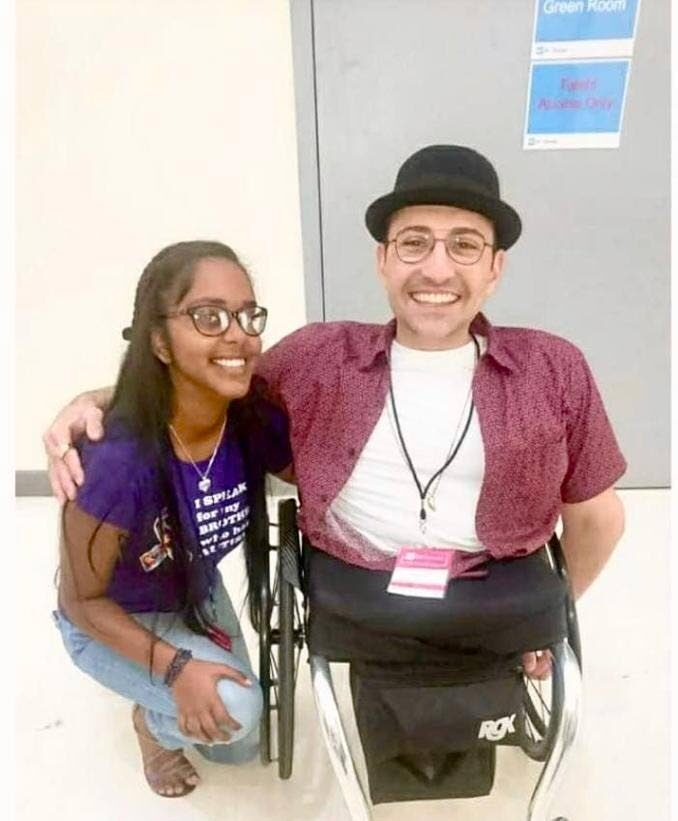Recognising the strengths in disabilities

DR RADICA MAHASE
Chances are if you talk to any parents of a child on the autism spectrum or any special needs, they will proudly tell you all the things that their children are good at, their strengths, despite the challenges. Too often as a society we tend to focus on the negatives of disabilities, the things that persons with special needs and disabilities cannot do, as opposed to the things that they excel at. When they excel at something we consider is as the exception rather than the norm, and we glorify their accomplishments as if it’s something that only happens once in a while.
This is partly due to deeply ingrained misconceptions which exist in our society – misconceptions that arise because of a lack of understanding and fear of those with disabilities. The little efforts made to achieve real inclusion only make it worst. Consequently, what we find happening is the situation where the approach is to "fix" persons with disabilities, to make them appear more "normal" and to fit into a world of "normal" people instead of looking at their individual strengths and appreciating the value they bring to our society.
This attitude is most obvious in employment. Article 27 of the UN Convention on the Rights of Persons with Disabilities states, “recognise the right of persons with disabilities to work, on an equal basis with others; this includes the right to the opportunity to gain a living by work freely chosen or accepted in a labour market and work environment that is open, inclusive and accessible to persons with disabilities.” Despite being a signatory to this, in TT, the chances of persons with disabilities having access to employment opportunities are very low. Employers believe that persons with any kind of disabilities will not be productive in their workplaces, will be difficult to deal with or will "cause trouble’ for their businesses.

Photo Courtesy - Rahul's Clubhouse -
According to disabilities rights attorney Ted Kennedy Jr, “Persons with disabilities present business and industry with unique opportunities in labour-force diversity and corporate culture, and they’re a large consumer market eager to know which businesses authentically support their goals and dreams. Leading companies are accelerating disability inclusion as the next frontier of corporate social responsibility and mission-driven investing.”
Businesses in our country fail to realise that employing persons with disabilities can bring excellent work ethics and unique skills on a level that might not be present with neurotypical individuals. According to Elijah, who is 25 years old with a learning disability. “I have been trying to get a job for the past five years. I have my CSEC and CAPE passes as well as computer skills and I have applied to many places. I got called for a few interviews but once they learnt that I have a disability, that’s the end of all my prospects. I considered not telling them but I don’t think I should have to hide my disability from anyone.”
Professor Allan Cole from the University of Texas, Austin noted, “Disabled persons contribute distinct insights, perspectives, and wisdom born of resilience, discipline, and typically a strong work ethic. Because persons with disabilities must constantly adapt to their surroundings, they also bring creativity, agility, persistence, openness, forethought, and capacity for solving problems.” Really, employers in Trinidad and Tobago are denying themselves the opportunity to take their businesses to a higher level by not employing persons with disabilities. They are the ones losing out on many levels.
Recent research has also focused on the character strengths of persons with disabilities and the positive impact on our society. Beatrice Lee, et al stated that “Character strengths are defined as positive personality traits that reflect core identity, produce positive outcomes for oneself and others, and contribute to the collective good… In a sample of adults with autism spectrum disorder, the most frequently reported character strengths were open-mindedness, creativity, and love of learning.”
Many parents of children on the autism spectrum will tell you how loving their children are, or how loyal and caring they are. Many parents will notice that their children are sensitive and protective of their siblings or anyone close to them and that they have a deep sense of empathy. Additionally, there is that sense of resilience that comes from dealing with daily challenges and the fighting spirit that often results in some persons with disabilities becoming advocates in the wider society, fighting for inclusion.
As we joined the world in commemorating International Day of Persons with Disabilities (December 3), let us reflect on the words of William E Lightbourne:
Hold my hand and walk with me.
We must break the back of social inequity;
We must empower every individual with a disability
To live with dignity in an inclusive society.
Radica Mahase is the founder/director of Support Autism T&T


Comments
"Recognising the strengths in disabilities"